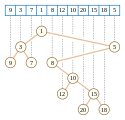| ||||||||
Fundamental Data Structures
edit- Introduction
- Abstract data type
- Data structure
- Analysis of algorithms
- Amortized analysis
- Accounting method
- Potential method
- Sequences
- Array data type
- Array data structure
- Dynamic array
- Linked list
- Doubly linked list
- Stack (abstract data type)
- Queue (abstract data type)
- Double-ended queue
- Circular buffer
- Dictionaries
- Associative array
- Association list
- Hash table
- Linear probing
- Quadratic probing
- Double hashing
- Cuckoo hashing
- Hopscotch hashing
- Hash function
- Perfect hash function
- Universal hashing
- K-independent hashing
- Tabulation hashing
- Cryptographic hash function
- Sets
- Set (abstract data type)
- Bit array
- Bloom filter
- MinHash
- Disjoint-set data structure
- Partition refinement
- Priority queues
- Priority queue
- Bucket queue
- Heap (data structure)
- Binary heap
- d-ary heap
- Binomial heap
- Fibonacci heap
- Pairing heap
- Double-ended priority queue
- Soft heap
- Successors and neighbors
- Binary search algorithm
- Binary search tree
- Random binary tree
- Tree rotation
- Self-balancing binary search tree
- Treap
- AVL tree
- Red–black tree
- WAVL tree
- Scapegoat tree
- Splay tree
- Tango tree
- Skip list
- B-tree
- B+ tree
- Rope
- Integer and string searching
- Trie
- Radix tree
- Suffix tree
- Suffix array
- Suffix automaton
- Van Emde Boas tree
- Fusion tree
